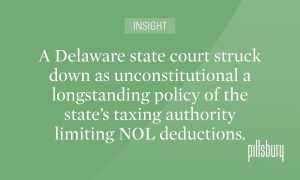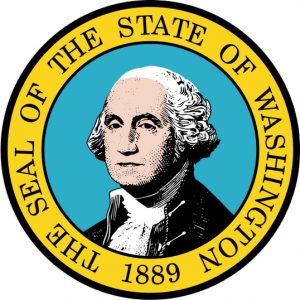Pillsbury SALT attorneys Carley Roberts, Zachary Atkins, Nicole Boutros and Evan Hamme will present during Tax Executive Institute’s Wisconsin Chapter Meeting on February 18. Continue Reading ›
Continue Reading ›
Articles Posted in States
Should San Francisco Taxpayers File Protective Claims for Recovery of the Homelessness Tax and the Commercial Rents Tax?
In 2018, San Francisco voters approved, by simple majority vote, two new gross receipts taxes: the Homelessness Gross Receipts Tax (SF-HT) and the Commercial Rents Tax (SF-CRT), with both  taxes effective as of January 1, 2019.[1] Because these taxes fund specific governmental services, they are designated as special taxes (specifically, the SF-HT funds homelessness services and the SF-CRT funds early childhood education). Since the California Constitution specifies that special taxes imposed by local government need two-thirds voter approval (i.e., a “supermajority”), taxpayer groups have filed lawsuits to invalidate these special taxes, as both were approved by only a majority vote (61% for the SF-HT and 51% for the SF-CRT).[2] As discussed more fully below, the courts have ruled against these taxpayer groups and the California Supreme Court to date has refused review.
taxes effective as of January 1, 2019.[1] Because these taxes fund specific governmental services, they are designated as special taxes (specifically, the SF-HT funds homelessness services and the SF-CRT funds early childhood education). Since the California Constitution specifies that special taxes imposed by local government need two-thirds voter approval (i.e., a “supermajority”), taxpayer groups have filed lawsuits to invalidate these special taxes, as both were approved by only a majority vote (61% for the SF-HT and 51% for the SF-CRT).[2] As discussed more fully below, the courts have ruled against these taxpayer groups and the California Supreme Court to date has refused review.
The pressing question is whether San Francisco taxpayers, who paid the SF-HT and/or the SF‑CRT for 2019 and 2020, should be filing claims to protect their rights to refunds in the unlikely (but not impossible) event that these taxes are ultimately rendered invalid.
New York Law Raises Property Tax Issues for the U.S. Nuclear Industry
Nuclear fuel storage facilities have been impacted by a change in New York law, which requires facilities located at permanently shut down nuclear power plants to be assessed as real property for ad valorem tax purposes, leading to potential larger, national impacts. SALT team members Zachary T. Atkins, Breann E. Robowski, and Craig A. Becker team up with Pillsbury’s Energy attorneys to discuss.
Transfer Tax and Distressed Real Estate: New York and California
Real Estate markets in major cities have taken a hit given the events of the past year. In the latest Swimming Lessons Series presentation, SALT partner Craig Becker and Real Estate partner Andrew Weiner explore the intersection of transfer tax and enforcement in New York and California. Continue Reading ›
Delaware State Court Strikes Down NOL Limitation, Presenting Refund Opportunity
A Delaware state court invalidated the Delaware Division of Revenue’s policy limiting net operating loss (NOL) deductions  for members of federal consolidated groups, holding that the policy violated the Uniformity Clause of the state constitution. Verisign, Inc. v. Director of Revenue, No. N19C-08-093 JRJ (Del. Super. Ct. Dec. 17, 2020). The decision presents a potential refund opportunity for Delaware corporate taxpayers who were members of a federal consolidated group, and for Delaware corporate income tax purposes had their separate-company NOL deductions limited to the group’s consolidated NOL.
for members of federal consolidated groups, holding that the policy violated the Uniformity Clause of the state constitution. Verisign, Inc. v. Director of Revenue, No. N19C-08-093 JRJ (Del. Super. Ct. Dec. 17, 2020). The decision presents a potential refund opportunity for Delaware corporate taxpayers who were members of a federal consolidated group, and for Delaware corporate income tax purposes had their separate-company NOL deductions limited to the group’s consolidated NOL.
Pillsbury attorney Zack Atkins explains.
To read the full article, please click here.
2021 California CLE Marathon Webinars
Pillsbury SALT partners Craig Becker and Breann Robowski will present during Pillsbury’s 2021 California CLE Marathons. This event features a wide variety of live webinars on timely topics. Craig and Breann will present “California Property, Transfer and Local Tax Updates” on Monday, January 25. Continue Reading ›
Continue Reading ›
Indiana Municipalities’ Franchise Fee Lawsuit Against Online Video Providers Remanded to State Court
 A federal district court held that under comity principles, Indiana state court is a more appropriate venue for a putative class action brought by three Indiana municipalities seeking to impose franchise fees on a group of online video providers. Order, City of Fishers v. Netflix, Inc. No. 1:20-cv-02351-JMS-MPB (S.D. Ind. Nov. 18, 2020). The federal district court remanded the case to the Marion Superior Court, where it was originally filed.
A federal district court held that under comity principles, Indiana state court is a more appropriate venue for a putative class action brought by three Indiana municipalities seeking to impose franchise fees on a group of online video providers. Order, City of Fishers v. Netflix, Inc. No. 1:20-cv-02351-JMS-MPB (S.D. Ind. Nov. 18, 2020). The federal district court remanded the case to the Marion Superior Court, where it was originally filed.
California’s Proposition 15 Is Failing While San Francisco Accepts a Bevy of Local Tax Measures
On November 3, California and San Francisco voters were asked to decide several tax‑related referenda with major implications across all business industries. Although it is too early to state with certainty, voters appear to have rejected Proposition 15, a measure that would introduce a so-called “split roll” property tax system. On the same day, voters in San Francisco overwhelmingly approved a battery of tax-related measures: Proposition F, which overhauls San Francisco’s business taxes; Proposition I, which doubles the real estate transfer tax on transactions exceeding $10 million; Proposition L, which institutes an aggressive new “Overpaid Executive Gross Receipts Tax;” and Proposition J, which repeals and replaces an annual parcel tax.
Pillsbury attorneys Craig Becker, Breann Robowski, and William Bennett explain.
To read the full article, please click here.
Washington Supreme Court Asked to Review and Overturn Lower Court Decision Invalidating B&O Surtax on Large Financial Institutions
 The fate of Washington’s Business & Occupation (“B&O”) surtax on large financial institutions remains uncertain as the state’s highest court has not yet decided whether to grant direct review or transfer the state’s appeal to the Washington Court of Appeals. On July 13, 2020, the State of Washington filed a direct appeal in the Washington Supreme Court seeking to overturn a trial court decision that struck down the state’s recently enacted surtax on large out-of-state financial institutions. Wash. Bankers Ass’n v. State, No. 19-2-29262-8 SEA (Wash. Super. Ct. May 15, 2020), appeal docketed, No. 98760-2 (Wash. July 13, 2020). On July 27, 2020, the state filed its statement of grounds for direct review with the Washington Supreme Court and on August 24, 2020, the respondents, the Washington Bankers Association and American Bankers Association (collectively, the “Associations”) filed their answer. Continue Reading ›
The fate of Washington’s Business & Occupation (“B&O”) surtax on large financial institutions remains uncertain as the state’s highest court has not yet decided whether to grant direct review or transfer the state’s appeal to the Washington Court of Appeals. On July 13, 2020, the State of Washington filed a direct appeal in the Washington Supreme Court seeking to overturn a trial court decision that struck down the state’s recently enacted surtax on large out-of-state financial institutions. Wash. Bankers Ass’n v. State, No. 19-2-29262-8 SEA (Wash. Super. Ct. May 15, 2020), appeal docketed, No. 98760-2 (Wash. July 13, 2020). On July 27, 2020, the state filed its statement of grounds for direct review with the Washington Supreme Court and on August 24, 2020, the respondents, the Washington Bankers Association and American Bankers Association (collectively, the “Associations”) filed their answer. Continue Reading ›
CalTax’s Splitting the Property Tax Roll Webinar Series
 Pillsbury partners Breann Robowski and Craig Becker will present during CalTax’s Splitting the Property Tax Roll webinar series in October.
Pillsbury partners Breann Robowski and Craig Becker will present during CalTax’s Splitting the Property Tax Roll webinar series in October.
Splitting the Property Tax Roll, a webinar series on the Technical Provisions of Proposition 15, will feature a new episode every Tuesday in October.
Breann will present during Episode 1, “California’s Property Tax System” on October 6. The speakers will discuss what California’s property tax system was like prior to the passage of Proposition 13 in 1978, provide an overview of the current property tax structure and how the measure has evolved over time, and discuss the provisions of Proposition 15.
Craig will present during Episode 2, “Ready, Set, Split Roll: The Impact of Proposition 15″ on October 13. This webinar will cover the economic impact of Proposition 15, including how the measure would impact consumers and private-sector employment. Speakers will cover how to interpret Proposition 15, drafting flaws, and how the measure would have specific impact on certain industries, including agricultural properties and vineyards, energy, and telecommunications.
For more information, please visit the event page.
CalTax members may find a recording of Breann’s presentation here and Craig’s presentation here.
 SeeSALT Blog
SeeSALT Blog


